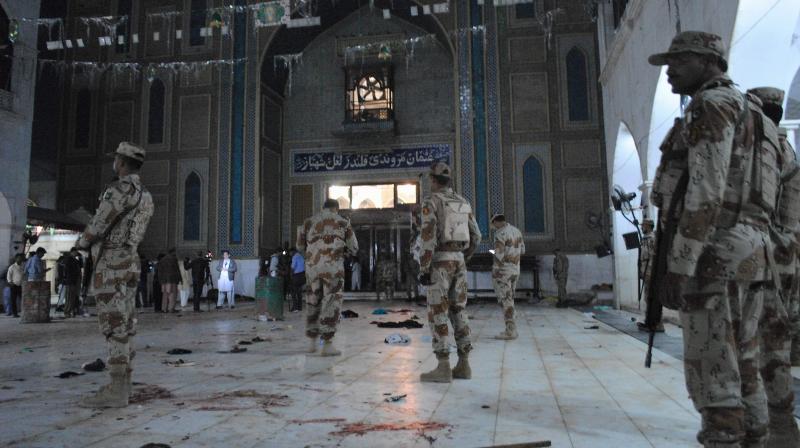On terrorism, some points for Pakistan to ponder

It’s obviously a tale of stark contrasts, as any number of commentators have pointed out since the suicide bombing that claimed some 90 lives on Thursday last week at the shrine of a 12th-century saint at Sehwan in Sindh.
As a spiritual guide, the man known as Lal Shahbaz Qalandar represents the blurring of artificial boundaries — the boundaries of faith, caste and gender — and elevates the common humanity we all share. His shrine facilitates the celebration of life and love. That concept is beyond the comprehension of the obscurantist merchants of death. All forms of syncretism and secularism are to them an abomination that calls for indiscriminate bloodshed.
This is not the first Sufi shrine they have targeted, and it’s unlikely to be the last. Of course, as the recent spate of terrorist attacks across the country reminds us, they do not restrict themselves to sites whose theological inclusivity and pluralism they despise. Yet there’s cause to hope that they will be taken aback by the resilience demonstrated in Sehwan, by the caretakers of the shrine and visitors alike. The bells did not fall silent, the dhammal never stopped. Sheema Kermani’s performance represented a reaffirmation of hope. Not only will life go on, but it will go on in a way that is completely at odds with the severely restricted mindset of the violent fundamentalists.
Sadly, though, it cannot reasonably be claimed with any degree of certainty that the beat of the drum will ultimately triumph over the dissonance of the bomb.
It will soon enough be 70 years since Pakistan came into existence, under the aegis of a founding father who clearly declared, on the eve of independence, that he did not envisage any barriers between faiths or any interference by the State in the personal beliefs of its citizens. But, as the Objectives Resolution adopted by an undemocratic Assembly barely months after his demise illustrates, Moh-ammad Ali Jinnah’s secular ideals cut little ice with those who used him in the preceding years as a conduit for their pseudo-religious fantasies.
This year also brings another landmark anniversary. By and large, Islamist fundamentalism remained on the periphery of Pakistani politics until 1977. Sure, much had gone wrong before then, but it was the advent of Gen. Zia-ul Haq’s military dictatorship that effectively sealed the nation’s fate.
Zia posited the armed forces he unfortunately commanded as the defe-nders of Pakistan’s “ideological frontiers”. That role has thenceforth not only remained intact but gone largely unchallenged. Zia thrived as a fiercely motivated Ameri-can puppet during the Islamist “crusade” agai-nst communism in Afgha-nistan, particularly during the Soviet occupation, while at the same time injecting obscurantism — alongside the Kalashnik-ov-and-heroin culture — into the Pakistani mainstream.
Given that so many of the terrorists who have helped to destroy Afghanistan in the past 40 years came from, or via, Pakistan, it seems a bit incongruous for the latter to be making demands on Afghanistan in the same context. But at least initially, it wasn’t Afgha-nistan that nurtured the Taliban and their various offshoots. It’s all very well to demand that Kabul hand over the purported terrorists listed by Pakistan, but let’s not forget how the latter responded when a previous Afghan government made similar demands.
In the immediate aftermath of the massacre at Sehwan it was reported that security forces had exceeded the appalling toll at the shrine in retaliatory actions. But who exactly did they kill, without the benefit of a trial? And who exactly are the people who have been picked up for interrogation? Does their suspected Afghan nationality alone provide sufficient cause?
Zia’s “ideological frontiers” mantra resounded when five social media activists, all of them questioning the state’s priorities, disappeared last month. Four of them returned home a few weeks later, but even the two who were able to exit the country have spoken not a word about their experience.
By arrangement with Dawn

